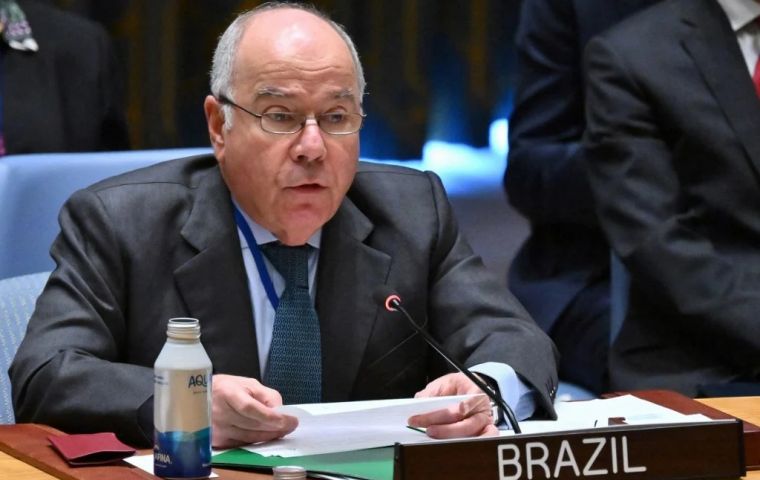MercoPress. South Atlantic News Agency
Brazilian FM critical of UN Security Council
 “We have the means to do something and yet, time and time again, we fail,” Vieira insisted
“We have the means to do something and yet, time and time again, we fail,” Vieira insisted Brazilian Foreign Minister Mauro Vieira was highly critical of the United Nations Security Council's performance regarding the ongoing war between Israel and the terrorist group Hamas. “We failed,” said the top diplomat of the country currently chairing the body, Agencia Brasil reported.
Vieira harshly criticized the council's delay in approving a resolution on the conflict between Israel and the Islamist group Hamas, which controls the Gaza Strip in the Middle East. At a meeting Monday afternoon, Vieira criticized the stance of some countries which, according to him, use the Council to achieve personal goals rather than to protect civilians in the Middle East.
“Since October 7, we have met several times and voted on four resolutions. However, we remain deadlocked, due to internal disagreement, particularly among permanent members, and thanks to the persistent use of the council to achieve their own purposes rather than putting the protection of civilians above all else,” he said. “Everyone is seeing our inability to unite and respond to a crisis that challenges us,” he added.
Brazil chaired the council in October and tried to push through a resolution for several days, listening to various countries. But on Oct. 18, when the text was put to the vote, it was vetoed by the United States, one of the permanent member countries.
The UN Security Council has five permanent members: China, France, Russia, the United Kingdom, and the United States. The others make up the rotating council. For a resolution to be approved, it needs the support of nine of the total 15 members, and none of the permanent members can veto the text. In addition to the proposal presented by Brazil, the United States submitted its version, which was vetoed by the Russians, who, in turn, had their two proposals vetoed by the United States and the United Kingdom.
The various unsuccessful attempts to present a common position fueled Vieira's criticism. He was chairing the meeting, but before reading his speech “following President Lula's guidelines”, he asked his colleagues to excuse him and spoke as the Brazilian Chancellor.
“Since the last time I spoke to this Council, last week, the child death count has risen by a thousand. Meanwhile, the Security Council holds meetings and listens to speeches, without being able to take a
fundamental decision: to end human suffering,” he said. According to him, the council has failed meeting after meeting to put the lives of civilians as a priority.
“While thousands of Israelis and Palestinians mourn their loved ones, while Israelis agonize over the fate of the hostages, while Gaza suffers in the face of the relentless military operation that is killing civilians, including an intolerable number of children, we have the means to do something and yet, time and time again, we fail,” Vieira insisted.
In a direct and critical speech, Vieira also called for an end to hostilities and access to medical care for civilian victims in the Gaza Strip. He pointed out that, in three weeks of conflict, there have already been 8,000 deaths, 3,000 of them children. At one point in his speech, the foreign minister cited Hamas as responsible for rekindling the crisis in the region with “terrorist actions.”
He added that there may still be time for the Security Council to take a stand on behalf of civilians and against hostilities in the region. “If not now, when? How many more lives will be lost before we finally move from rhetoric to action?” he concluded.
In recent weeks, the council has witnessed a dispute between the United States and Russia over the leading role in the discourse. While the Americans, supported by the United Kingdom, demand a resolution guaranteeing Israel, their ally, the right to respond to the attacks it has suffered, Russia proposes a ceasefire but does not mention Hamas. Nor do the Russians condemn the Islamist group for the actions that started the latest chapter in the historic conflict in the region.
As they both have veto power, there is always the position of one against the resolution supported by the other. In the resolution presented by Brazil, which was more likely to be approved, Russia abstained. In this case, it was up to the United States to overturn the text.
(Source: Agencia Brasil)




Top Comments
Disclaimer & comment rulesCommenting for this story is now closed.
If you have a Facebook account, become a fan and comment on our Facebook Page!